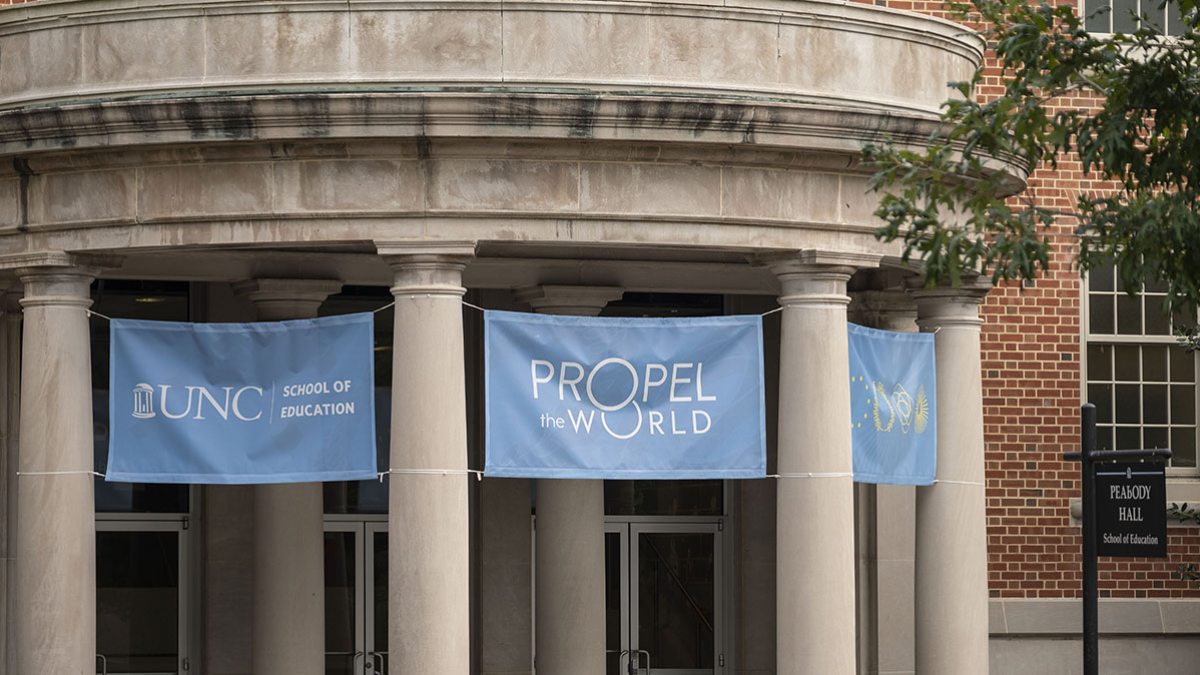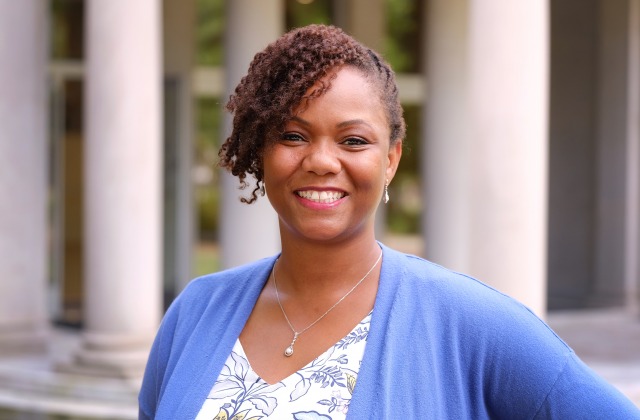Empowering the next generation of bold leaders
The program director of the UNC School of Education’s Human and Organizational Leadership Development talks about her students as future leaders.

Launched in the fall of 2021, the UNC School of Education’s Human and Organizational Leadership Development program will graduate its first students in May 2023.
During the spring 2023 semester, many HOLD students are completing capstone projects to complete the major and, more importantly, put their learning around leadership and organizational change into practice.
Those capstone projects range in terms of their focus — from implementing new employee policies that promote positive workplace cultures to developing outreach strategies for a new demographic of consumers. And they range in organization served; students are working at organizations that include the Department of Public Instruction, Versado Training and North Carolina Coalition Against Domestic Violence.
Jemilia Davis, HOLD program director, sat down to talk about leadership, her students, the classroom experience, and what comes next for her students.
What does leadership look like today?
We have seen leadership evolve over time. What we’re seeing is a growing space for expressing leadership in different ways — leadership by different people depending on who you are and what you bring to an organization. That is as crucial as what you do to promote positive outcomes for that organization.
When I think about how HOLD students bring in their voices about leadership, they are really starting to recognize, “Wow, the abilities that I have, and who I am naturally, and the things that I gravitate to can really contribute to me being a positive leader, and it doesn’t have to be connected to a position. It doesn’t have to be connected to a specific responsibility or a title.”
They are realizing they can lead from anywhere and asking themselves, “Am I engaging in the practice of leadership that helps me make a change — and contribute to change — I want to see in a larger society?”

Jemilia Davis, HOLD program director.
How we view leadership has seemingly changed very quickly in recent times and continues to change in real time. How do you frame that in the classroom?
What I always challenge myself to do is to create space in the classroom for students to share how they are viewing leadership. As an instructor who has dedicated time and energy into the study of leadership and organizational theory, there is value to hear from students about how they plan to practice this in in the real world. [Students] are truly the future and are crafting this world for themselves. They bring so many experiences into the classroom that make our conversations so much more dynamic.
One of the things students consistently say they enjoy about the HOLD program is that we encourage reflective practice. That reflective practice really involves them figuring out who they are [as leaders] and how they view things.
They are understanding that when it comes to leading an organization, they are not going to be the end-all-be-all. They can be great at public speaking but terrible at strategic planning. And if strategic planning is not your calling, that means you need to call on somebody else. They are coming to understand that if you’ve done the digging to identify your strengths — and acknowledged where you don’t thrive — you need someone else to help you in order to make a difference.
The students also appreciate being able to dig in deeply like that through case studies and conversations about what’s happening in the real world.
What does your students’ version of leadership look like?
They may have a different conceptualization of leadership than your or my generation. There are a lot of things they are questioning. I have two thoughts about that from what I have seen in my classrooms.
First, I think they are being a lot bolder about demanding inclusivity for all individuals and workspaces. They’re thinking creatively about that and asking “How does that work?”
In class, we talk about controversy with civility. [Students] are more willing to engage in that once they feel they are in kind of a brave space where they can speak freely about what they’re thinking about but also challenge each other.
And second, they’re not relying on precedent as much, which can be kind of scary to folks across generational lines. People from older generations might approach challenges in traditional ways. I’m in a generation that’s a little bit more flexible, but maybe not as flexible as this next generation which is like, “Let’s turn the table upside down and figure out how to do this from scratch.”
You lead the HOLD program, but you also conduct research and guide students in their research. Can you tell me a little bit about that research?
Research isn’t necessarily included in my job description because I’m a clinical faculty member, but I still do quite a bit of research.
Some of the highlights I’ve experienced regarding research have been working with students. Working with [HOLD student] Taylor Molina on her research project, that was really enjoyable being able to help guide her through what it’s like to build out a research plan. We got a chance to really engage closely this past summer, and her research about women’s experiences on college campuses around the world has been eye-opening.
In my own work, my lens has always been from a leadership standpoint and how to create and promote equitable surroundings and outcomes on college campuses.
One project I’m wrapping up is an article in volume 202 of New Directions for Community Colleges focused on Black community college presidents in the Southeast and their approach to promoting equity, especially in predominantly White spaces; talking with them and hearing about the strategies they use and seeing to what extent they promote equity while acknowledging their own personal underrepresented identity.
That was a really exciting project to get to talk to Black community college leaders who see themselves in the students they work with. It’s definitely something I am excited to share with the world.
HOLD is about to graduate its first students. What are you most excited about for them?
It is a big job to be the first in anything! Our first graduating class are committed trailblazers for declaring a major that only had promises to offer. I am most excited for them to see the payoff of trusting their intuition that this major would be a catalyzing stepping stone for the next phase of their careers. I am excited to see where they end up and how they will continue to propel change in our world because there is no doubt the amazing they are today is only a fraction of how amazing they will be in the future.




